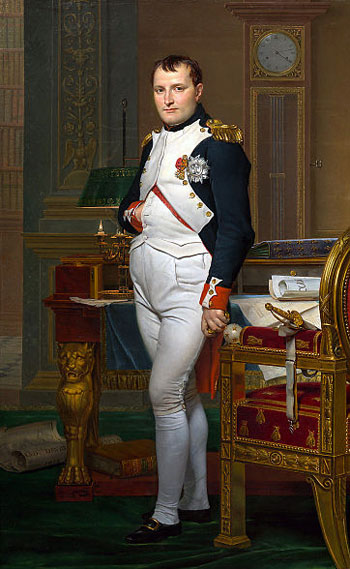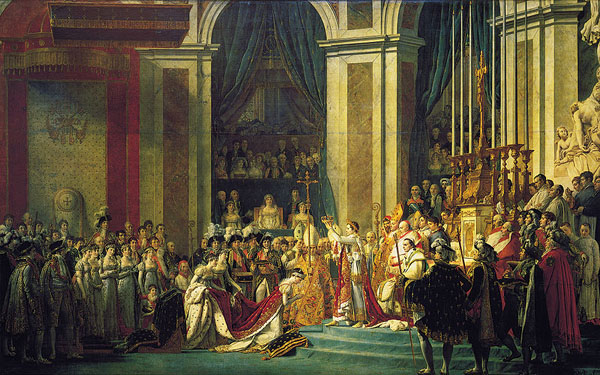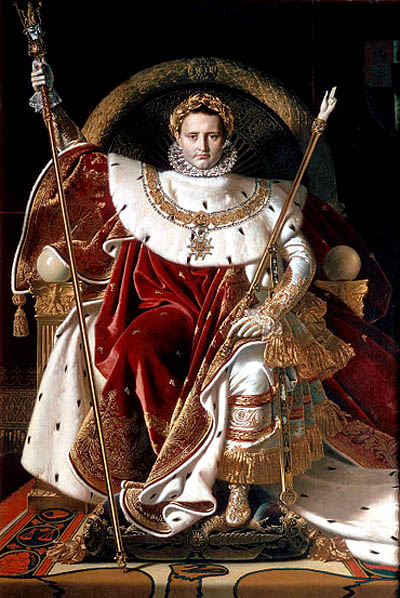Napoleon Bonaparte - the talented general of the world
Napoleon Bonaparte (August 15, 1769 - May 5, 1821) was an outstanding military and political figure in France.
Napoleon is a talented general of France and the world
Napoleon was born on August 15, 1769 in Ajaccio, on the island of Corsica (once Italian, later sold by Genoa authorities to France). Napoleon is the fourth of eight children and is the second son of Carlo Bonaparte and Letizia Ramolino.

Portrait of Napoleon.
At the age of 9, Napoleon was sent by his father to a military school in Brienne-le Chateau, a small province near Troyes, France.
Napoleon is a sensitive, lonely teenager who is often bullied by classmates. The cruelty of his classmates made Napoleon fall into his dreams of personal glory and military victories, which later made his reputation.

Napoleon's coronation scene.Painted by Jacques-Louis David, the painting is on display at the Louvre Museum, Paris, France.

Napoleon on the throne, Artwork by Jean Auguste Dominique Ingres.
Napoleon was very good at mathematics but in other subjects, the talent of this talented general was only average. In 1784, Napoleon was selected into the Paris Military Academy, following the Artillery Army. At this Military Academy, his rank was second lieutenant and ranked 42 out of 58 new school officers.


Napoleon and the Legion of Legion, the army founded by Napoleon himself and commanded.
Later, Napoleon served at the Le Fere Artillery Regiment, stationed at Valence. This is a training school for young artillery officers. He continued to learn by reading a lot of tactics and strategies, studying the works of Voltaire and Rousseau and he also wrote his own stories. Later, this work was compiled into a volume of "Letters to the Island of Corsica" (In French Lettres sur la Corse) which describes his feelings for France.
Glorious victories
On July 14, 1789, the French bourgeois revolution overthrew the monarchy, Napoleon actively participated in the Jacobin Club, at which point he was a lieutenant. To avoid British forces in Corsica, Napoleon brought his family to Marseille, France. The French Revolution shocked all of Europe, and European feudal forces joined forces to attack France. The revolutionary army has all gained victory, but the port of Toulon in the south of France is still occupied by royalists and British troops.
In October 1795, Napoleon was promoted to captain and directly commanded the army during the siege of Toulon , at which time the city was in the hands of British soldiers. His mission was to be an artillery commander so he could tell people he was a man of great military knowledge. In late 1795, Napoleon chased the British troops out of the city. After that siege, his popularity spread throughout France.
In 1795, after a period of disuse, the fortunes came to Napoleon. Because the royalist army rioted in Paris, the situation became very serious, the government decided to appoint Napoleon as assistant to Viscount Barras, commander of the Paris guard. With artillery in hand, Napoleon quickly extinguished the riot. And since then his public road has been open.
In 1796, Britain, Russia, and Austria joined forces to concentrate on attacking France. The French government sent four armies to fight. Napoleon was appointed the 4th army commander to attack Italy to restrain the Austrian army. In a short time, he defeated the Austrian army in Italy and marched into Austria's territory to the capital of Vienna, making Austria sign an armistice . Napoleon's victorious army returned to Paris in glorious glory.

Napoleon during the Northern Italian campaign in 1796, the famous painting by Jacques-Louis David.
To thoroughly defeat Britain, in 1798, the French government decided to fight Egypt to prevent British troops from advancing to India. Napoleon was appointed commander of the Eastern army , and he quickly captured Egypt. Napoleon brought more than 35,000 troops, including many experts from many fields, including mathematicians like Monge, Joseph Fourier, Laplace, and Berthollet.
The French army defeated the Egyptian Mameluk army at the Battle of the Pyramid but failed to capture the Turkish Akko Fortress (or Acre) due to the support of the British Fleet led by Admiral Sydney Smith.
After the peace treaty Tilsit (1807), Napoleon agreed with the Tsar and reorganized the economy where he occupied. But because it was impossible to defeat the British army with the army, Napoleon decided to weaken Britain by preventing British vessels from finding a market for goods in Europe. The meaning of this economic war was to strangle Britain and not allow any British ship to dock even though it was not British merchant ships, so British flag ships were destroyed. In order to maintain the economic war, Napoleon found it necessary to control the European coasts such as Germany, Italy, Spain and Norway to combat smuggling trade. Before the French invasion, the people of Spain and Austria rebelled but in July 1810 French troops brutally suppressed them and extinguished those revolts.
Realizing that Russia was still trading with Britain, Napoleon mobilized nearly 65,000 troops in 1812 with the aim of invading the Russian Empire. To fight to protect the country, the Russians rushed to build a large army of about 70-80 thousand warriors but relatively inadequate equipment, only about 45,000 regular troops equipped with guns, the rest is the military and cavalry of Cozak. The patriotism of the Russian people boiled over, they resolved to fight for revenge for the defeat to Napoleon in Austerlitz and Friedland, to tear away the humiliating peace under the Tilsit Agreement . They were also determined not to bear vengeance for Napoleon, and did not let the enlightened envoy of the monster in Saint Petersburg.
Marshal Mikhail Illarionovich Kutuzov - a famous general of the army and Russian people - became commander in chief of the Russian Army against Napoleon. During the fierce battle in Borodino, the Russian Army defeated many invaders, then they gradually withdrew from the battlefield to preserve their forces. The great war in Borodino became a heavy blow to Napoleon as well as his dictatorship. Napoleon failed in his main goal of destroying the Russian Army in a single battle. He then proceeded to take over Moscow, but the Russian Army frequently attacked the invaders. Due to being so weak, Napoleon intends to associate with some groups of farmers against the government but failed.
In October 1812, Napoleon was forced to order a withdrawal from Russia. And on the way to withdraw, the French were fiercely pursued by the Russian army and severely damaged. When leaving the territory of Russia, Napoleon had only 127,000 troops in his hand (and due to the spread of troops along the road to ensure communication, the actual number was only about 30,000 troops).
100 days dynasty
The European generals saw clearly that they could not win Napoleon militarily so he used his political power to defeat him. The coalition attacked the Paris capital when he was not wary. By the beginning of 1814, Napoleon was forced to abdicate and was banished to Elba Island (a small island off Italy). Bourbon feudal court of King Louis XVIII, King Louis XVI's brother returned to France, began recapturing the land lost in the revolution and became the successor king. On May 30, 1814, France regained its border. However, the French people and soldiers always expected Napoleon to return. Without Napoleon, King Louis XVIII suffered a great deal of political difficulties and since then weakened France, the industry also developed more slowly, while Britain was richer thanks to its economic development.
One evening in March 1815, Napoleon returned to Lyon from the island of Elba. Bourbon court sent many legions to fight but all other legions to shout "Ten thousand emperors" and run after Napoleon. Napoleon did not waste a bullet to return to the throne of France. The news Napoleon returned to make the European countries panic, they hurriedly allied with each other and pulled troops from the four directions toward the French. This time, the army was led by the Prussians and the British, concentrating the army in the Belgian region. But it was here that Napoleon commanded the French to defeat many wings of the coalition.
Fateful failure
The Battle of Waterloo took place on Sunday June 18, 1815 in a location near Waterloo, in present-day Belgium. The French Royal Army under Napoleon Bonaparte was defeated by the coalition of the Seventh Alliance, including British and allied forces led by the Duke of Wellington and commanded by the Prussian army led by Gebhard von Blücher. This is the battle that ended the Waterloo campaign and also the last battle of Napoleon. The defeat at this battle put an end to the throne of Napoleon's French Emperor and his one-hundred-day dynasty.

Napoleon died in St Helena on May 5, 1821.
It was the simple but very useful things that he learned that contributed to his successes later. Napoleon Bonaparte had a striving for his childhood, and he was rewarded. It was the result of his wars and successes in conquering vast territory in Europe. That he was one of the largest and most prominent military men of all time in France.
At Saint-Helena, Napoleon lived the last days of his life (he was poisoned by his close friend with mercury, which at the time was used to kill mice). The once magnificent European emperor of Europe died May 5, 1821, at the age of 52 years. Before he took his last breath, he said: "France . Army . Move forward" .
By 1840 the French government returned his remains to Paris. Napoleon rested at the War Memorial (Les Invalides). Another recent document said that he died of stomach cancer, not poisoning.
Currently, there are many Napoleon memorials in France. And of course, these are places that attract a lot of visitors.
He was the founder of the Bonaparte dynasty and became the French Emperor from 1804 to 1815 under the name Napoleon I. More specifically, he went into history as one of the world's most talented generals .
Currently, Napoleon's tactics and campaign are studied at all military academies around the world.
- Learn interesting facts about Napoleon Bonaparte Emperor
- Journey of three sinking seven floating
- Discover Napoleon's horrifying nocturnal mystery in the Egyptian pyramid
- Discovered the burial pit of 200 Napoleon soldiers in Germany
- Uncover the mystery of Napoleon's cause of death
- The 200-year-old gold ring Napoleon presented his first love
- 10 legendary swords in world history
- Napoleon's hair mysteriously appeared in Australia
- Invasions failed in world history
- The general remains of the most respected Napoleon are found under the dance floor in Russia
- Napoleon's army disintegrated because of lice
- Suez Canal - Great dream of kings
 Biography of hero Vu A Dinh
Biography of hero Vu A Dinh History of hematology
History of hematology Who is Mr. Tam Da 'Phuc-Loc-Tho' and what does it mean?
Who is Mr. Tam Da 'Phuc-Loc-Tho' and what does it mean? Unbelievable facts about the history of the oil and gas industry: Gasoline used to be cheaper than water, so abundant that it had to be dumped into the river...
Unbelievable facts about the history of the oil and gas industry: Gasoline used to be cheaper than water, so abundant that it had to be dumped into the river...